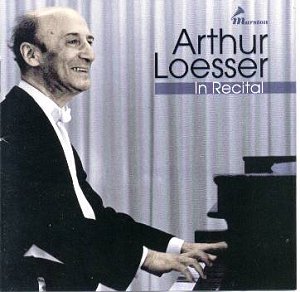This is an enchanting set. Best known for his classic
book Men, Women and Pianos; a Social History, Loesser
was born in 1894 and studied in New York. Perhaps uniquely for a pianist
he studied zoology – at Columbia – as well as studying the piano at
the Institute of Musical Arts (later to become Juilliard). A Berlin
debut just before the First World War was followed by a return to America
and a domestic debut in 1916. He must have piqued sufficient interest
even then because he was soon recording. Whilst violin admirers know
him from his significant contribution to Toscha Seidel’s late 1920s
and early 1930s sonata recordings Loesser had actually accompanied Maud
Powell on her Victors in 1917. From 1926 he was associated with the
piano faculty of the Cleveland Institute. Linguist, soloist, critic,
accompanist, author, pedagogue he also had another distinction to his
name; he was as witty as his half brother Frank "Guys and Dolls"
Loesser.
What is preserved in Marston’s double CD set consists
in the main of the 1967 Town Hall, New York recital and those from the
Cleveland Institute of Music, of which he was by now Head of Piano.
There is also a snippet from a Maryland concert a few years earlier.
Some of this has been available before, on an International Piano Library
LP, issued in 1972 and of real rarity now, but for most people this
will be their first exposure to Arthur Loesser. His own programme notes
are reprinted, including his famous Sic Transit Gloria Mundi notes for
the Town Hall concert in which he disinterred some half-forgotten works.
His announcements from the stage are full of urbanity and charm and,
yes, that famous Loesser wit, qualities I’m glad to say that are gloriously
reflected in his pianism.
Infectious brio informs his Dussek, the fingers in
fine mechanical fettle, runs full of clarity and he follows this with
another "Czech" work, Hummel’s La Galante. There is an effortlessly
affecting lyricism to his phrasing here, before some strong and animated
playing, full of fun and infectious liveliness, sees the work to a splendid
conclusion. The Field Nocturne is simply ravishing. As if to turn the
mood he programmes Clementi’s B flat Sonata and he is boldness itself
in the opening movement, elegantly relaxed in the central panel and
fiery and colourful in the finale. All these items by the way were played
on a John Challis nineteenth century replica. It gives even more bite
and sparkle to Loesser’s playing. His Jensen is romantic but virile
and he makes the Rubinstein Prelude and Fugue – so seldom programmed
it’s almost invisible – less clotted than it can otherwise seem whilst
managing to evoke its ingenious romanticism. Loesser himself tells the
audience that he learned Paderewski’s Legende from Stojowski, Loesser’s
erstwhile teacher, and he "opens out" to optimum effect. He
is as alive to the frequent drolleries of his chosen repertoire as to
the more exotic pieces – take Godowsky’s The Gardens of Buitenzorg,
from his Java Suite for example – languorous and exotically perfumed
and played pretty much to perfection. He realises the two pieces from
Reger’s splendid From My Diary with astute intelligence, especially
the insistence of the D minor Vivace. If Loesser can’t bring off Casella’s
slightly mocking homage to Chopin – the Grazioso – then frankly no-one
can and he can deal with the Anti-Grazioso’s brittle dissonances just
as pertly. Petri wasn’t the only pianist of that generation attuned
to Busoni; listen to Loesser’s reflective, almost impressionist calm
in the Second Sonatina and also to the mordant, reflective conclusion.
I won’t intercede between Loesser and his programme notes for Moszkowski’s
Valse – you’ll have to read them yourself and you’ll enjoy it. The encores
are delicious. As is the whole of this recital.
The second CD is devoted to sterner stuff – Bach, Haydn
and Prokofiev principally. In his playing of Preludes and Fugues – two
from Book I, one from Book II – he reveals himself as a Bachian of the
utmost discretion and clarity. All the voices are brought out, there
are no obvious romanticisms or instances of significant over pedalling
but his aesthetic does remain broadly romantic in feeling. His Haydn
is alive, felicitous and witty – it’s a very small seven-minute sonata
but Loesser lavishes care on it. He was well suited to Prokofiev; and
the classicism of the 1923 Fifth sonata clearly appealed to him, as
did its underdog status. Incidentally he plays the original version
but for the last five pages where he utilises the 1953 revision. I admired
the genial Beethoven but even more Loesser’s way with Chopin. In fact
I admired everything he does as I do Marston’s excellent sound (pitch
fluctuations on a few tracks are relatively mild). The booklet is splendid.
I’ve seldom enjoyed time with a pianist more than these two hours plus
with the impish, convivial, enormously talented Arthur Loesser.
Jonathan Woolf



